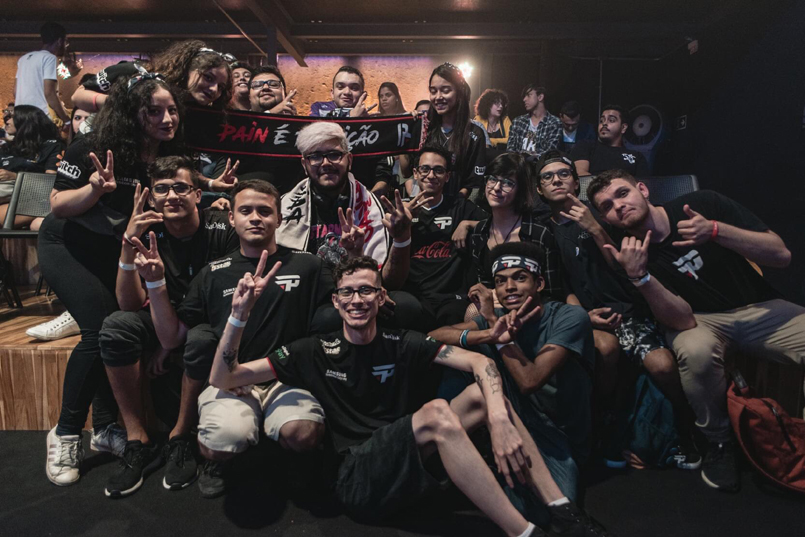Brazil is considered the new epicenter of the COVID-19 pandemic, according to the World Health Organization, and like in other countries, the stay-at-home order is driving a significant increase in the consumption of digital products and businesses, including the country’s esports market.
During the Brazilian League of Legends Championship (CBLoL), a record-breaking 336K simultaneous viewers watched the match between paiN Gaming and Santos on June 7 on Twitch. Following that milestone, the Brazilian esports industry reported improved numbers and increased interest in several esports-related spaces.
Tiago Xisto, CEO of Vivo Keyd, one of the largest and most traditional Brazilian esports organizations, reports an increase of around 25% in viewership and audience engagement for online action. Meanwhile, paiN Gaming CEO Thomas Hamence reports increased access and consumption at the organization’s online store last month. INTZ Co-Founder and CEO Lucas Almeida claims that engagement records are being broken month-after-month, as its reach on social media (Twitter and Instagram) increased from 8.3M in February to 17.9M in April.
Local media also confirms the growth of the audience, but it also highlights the difference between the video games audience and esports fans. Barbara Gutierrez, editor-in-chief of the gaming website IGN Brasil and of Versus, one of the more prominent esports websites in Brazil, tells The Esports Observer that “while the gaming audience is consuming less content and using their time to play more, esports fans increased demand and are consuming more than what would be expected today.” According to Google Trends, the search for “esports” doubled in Brazil from March to April. May and June show stats still 50% above the number observed before the pandemic.
This growth indicates an advantage that esports has gained over traditional sports, which has suffered considerable losses from the suspension of competitions and salary cuts for athletes and employees to maintain financial health. None of the esports organizations interviewed by The Esports Observer reported financial difficulties or payroll issues.
“Electronic sports have a connection that ‘traditional’ sports never had,” Gutierrez said. “Without the matches, how do stars and football [soccer] teams manage to communicate with fans? They are not as close to their fans as esports teams and pro players — that’s because the online environment is already the habitat of electronic sports.” Xisto, from Vivo Keyd, shares the same view: “Different [from] traditional sports, esports championships have not stopped. So we were lucky to be able to continue competing through online systems.”

The biggest reported changes are related to training logistics, teamwork, and the absence of physical fan-attended events. Almeida explains that the impact was mainly in the in-game field. ”The first 30 days were to understand the situation, organize, and reformulate processes,” he said. “After this period, we were able to return to work as hard as using our training center, where employees and athletes from four of the 14 modalities (League of Legends, Counter-Strike: Global Offensive, Rainbow Six, and Free Fire) trained daily. The competitive impact in these modalities of greater exposure was high.”
Vivo Keyd also recognized a decrease in performance. Xisto reports that there was a break in the planned flow of competitive teams, who needed to have their work reviewed and reformulated to meet the new reality of distance training. PaiN Gaming, on the other hand, had no difficulties in adapting to the pandemic and does not report losses in any aspect of its operation.
In terms of administrative and team management, no loss of performance was reported, and INTZ affirmed that “the home office has been working well, with similar income.”
Events Industry Downfall
Although the competitions have not been canceled nor sponsors lost, structural services for events in Brazil have suffered the most during the crisis. A survey by SEBRAE, an institution that supports entrepreneurs in the country, indicated that 98% of the sector was affected. Entrepreneurs in the esports events space are trying solutions in the management of their businesses to try to mitigate the economic effects of the pandemic.
For Xisto, the lack of face-to-face events also affects the content produced in esports: “We have [seen] a drop in quality since there are no post-game interviews nor many other forms of content that could be made.”

Regarding the most affected areas and the economic effects that can be caused by COVID-19, Gutierrez says that “many initiatives related to this period are being announced, such as live streams and tournaments destined to raise funds for humanitarian causes.”
Sponsorships
The economic crisis caused by the pandemic, however, seems to have left Brazilian esports relatively unscathed. “We have all social platforms and communication channels open and [is] already very well received by fans, with a well-established number of followers. That is exactly where the other sports are suffering the most,” says Gutierrez. “Therefore, the lives of pro players, championships, and the dynamics of their relations with sponsors have remained relatively normal.”
Vivo Keyd and INTZ reported that they are currently securing or closing new deals, while strengthening the good relationships with their current sponsors. Almeida does not hide his happiness for the evolution of esports in Brazil, but says that it is growing as it was expected to by INTZ even with the pandemic. Hamence also points out that, in addition to keeping all of its current sponsors, it was not necessary to dismiss any employees in this period.
Gutierrez, however, regrets a cultural factor that could be preventing the Brazilian esports market from taking off for good: “It is very sad that we have to go through a worldwide pandemic for society to start accepting games as a viable and not harmful way of entertainment,” she said.

